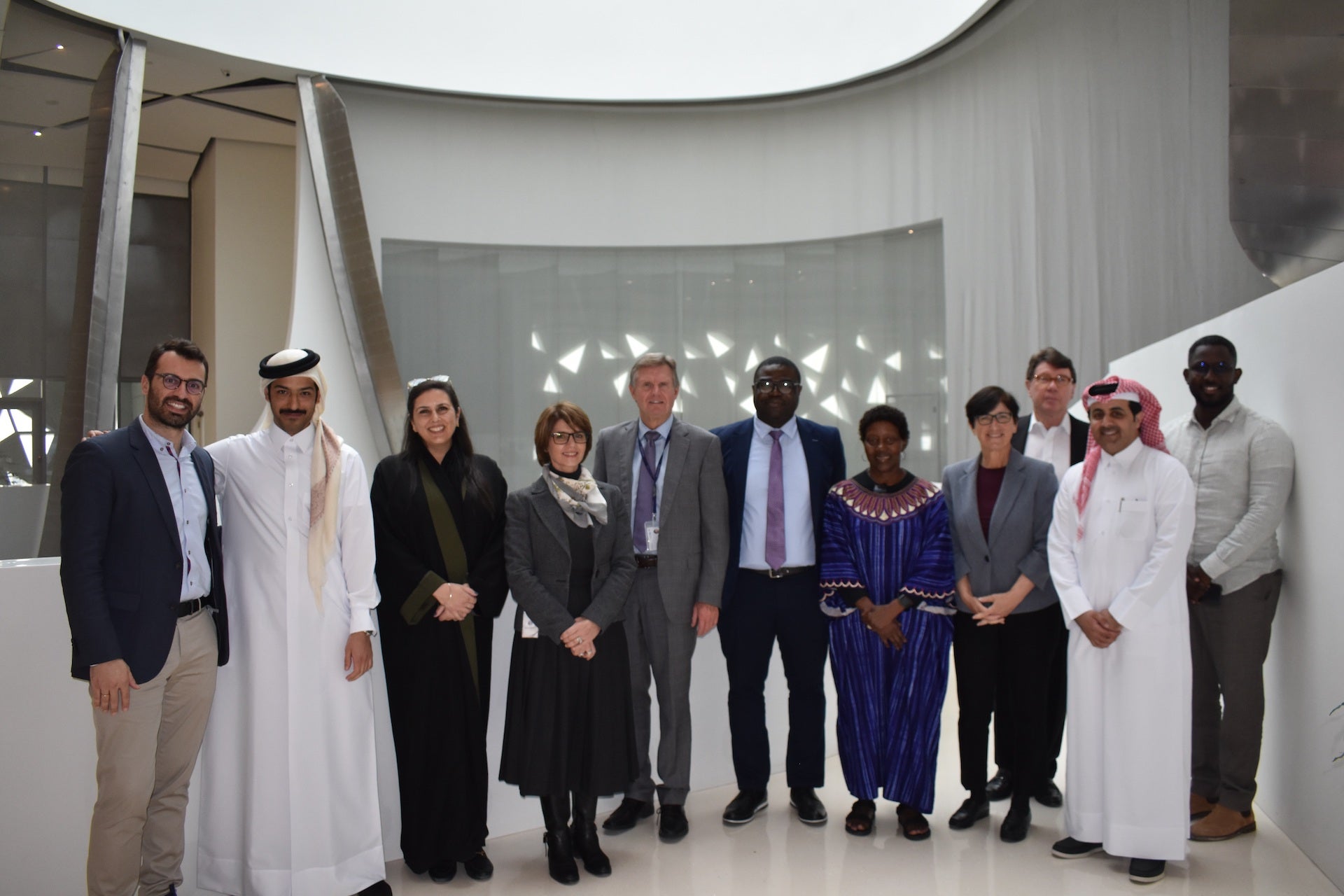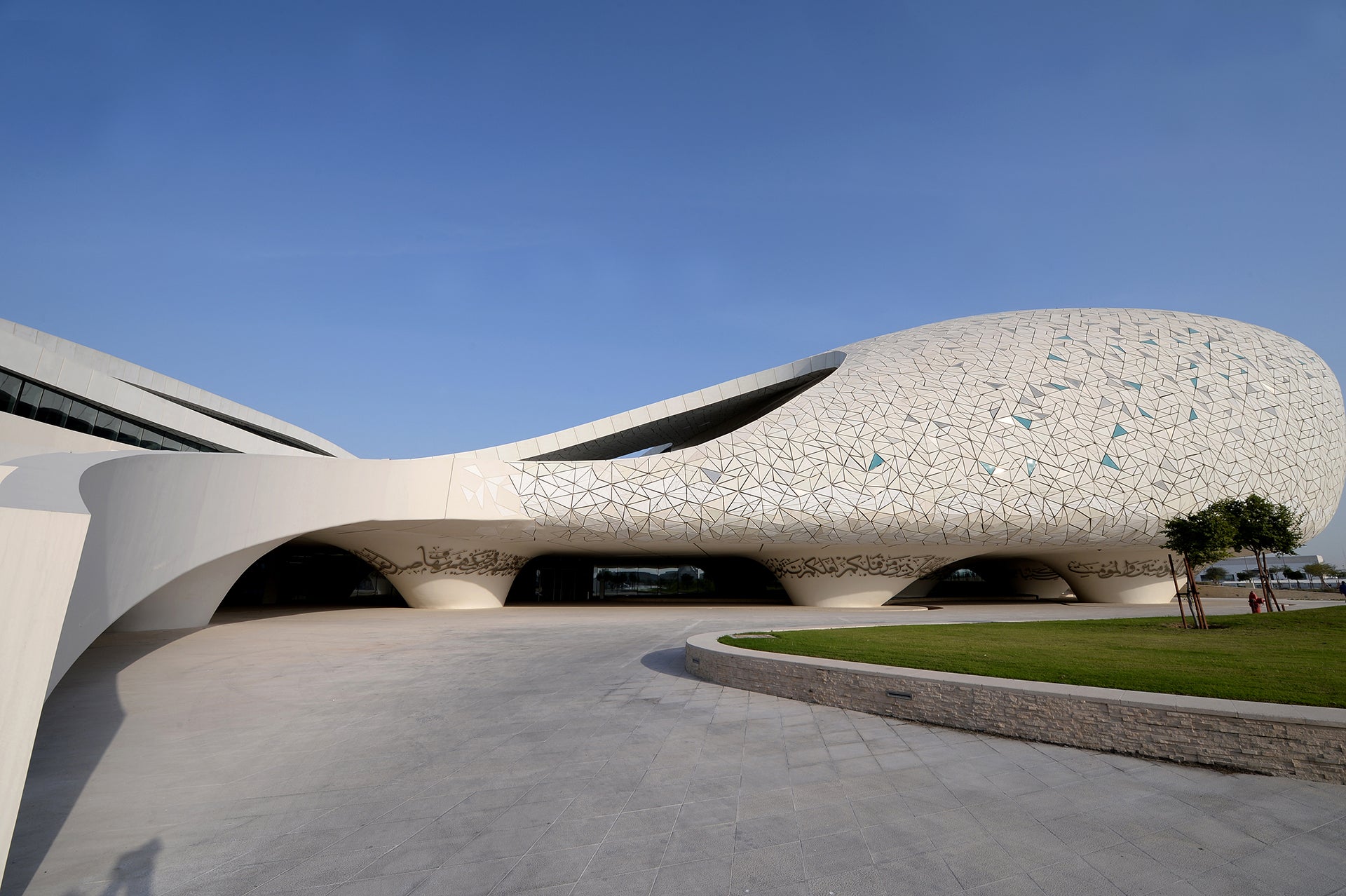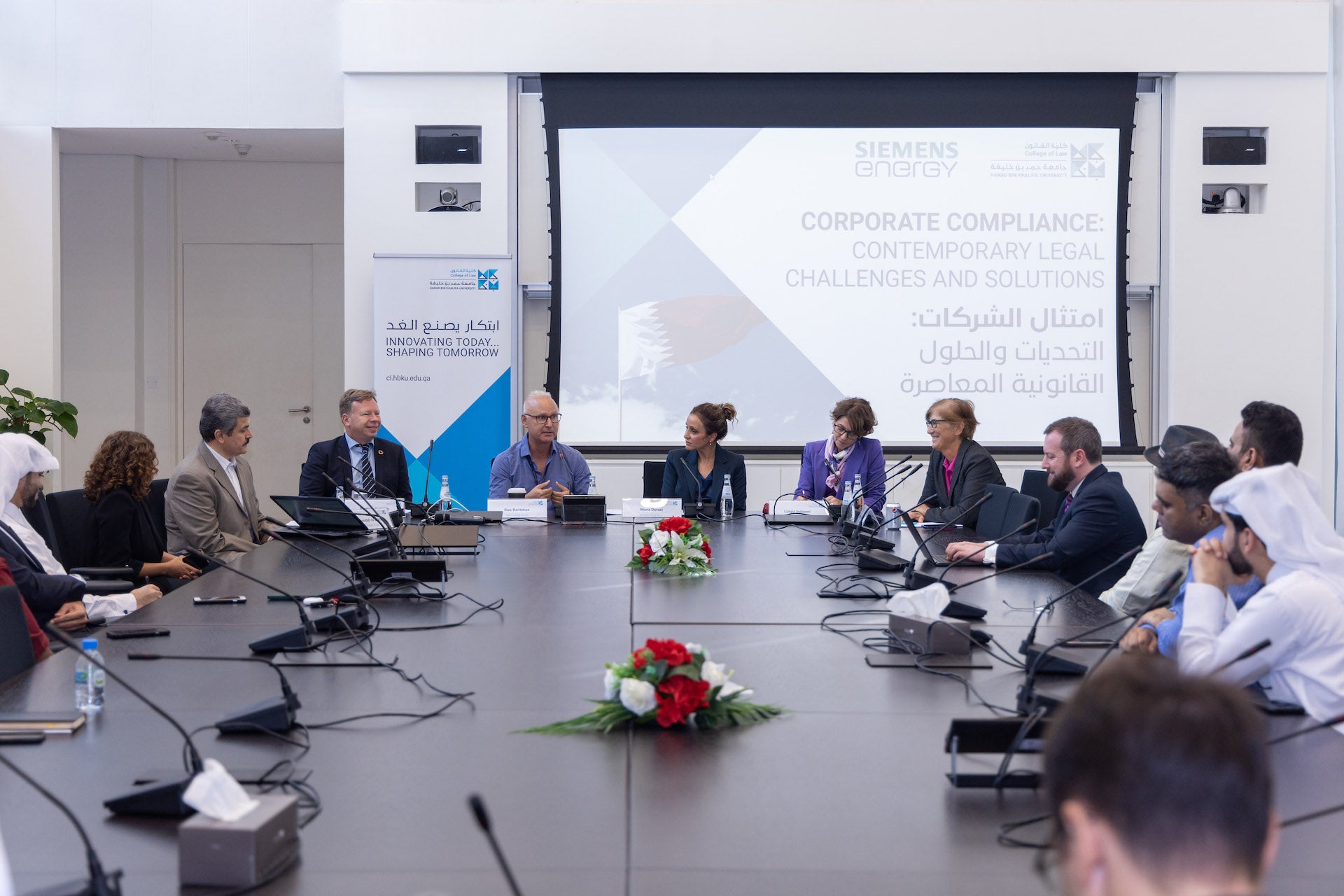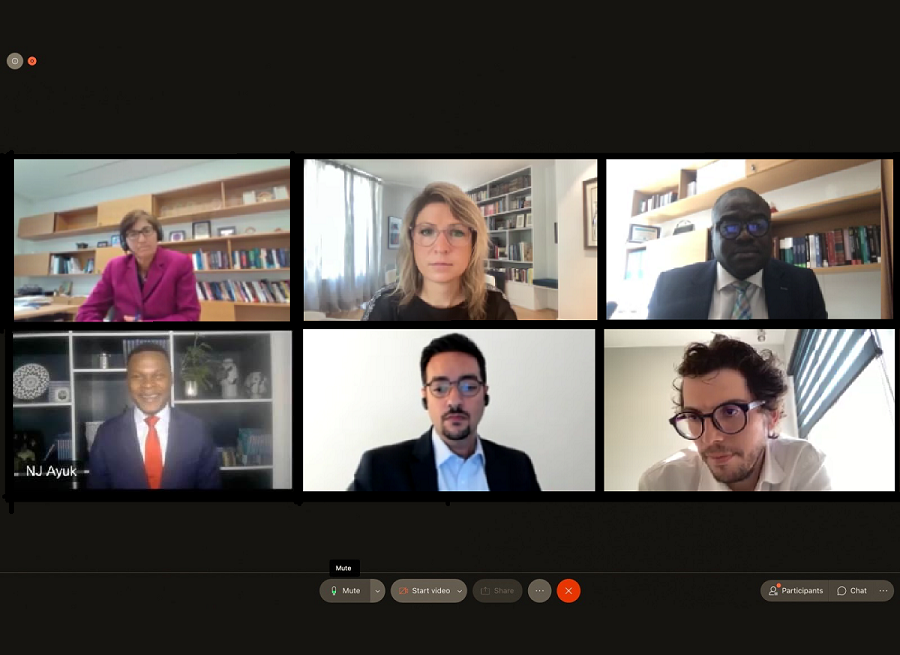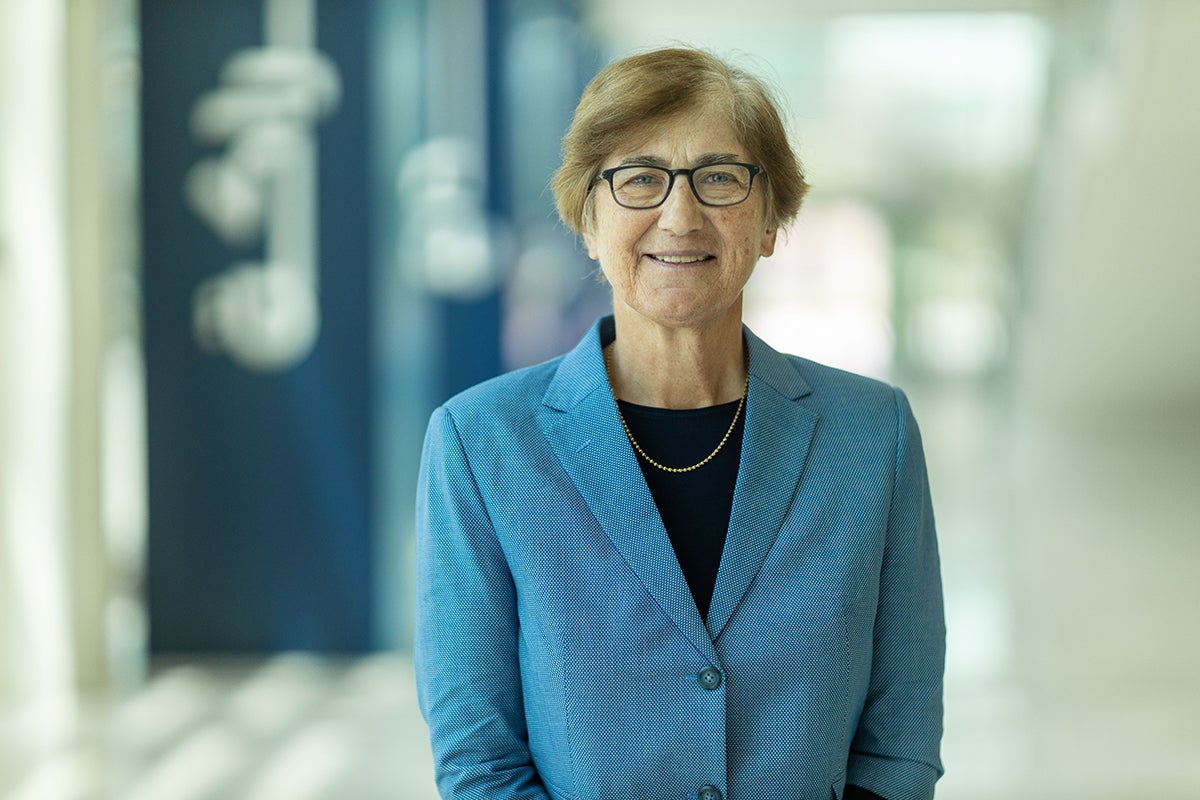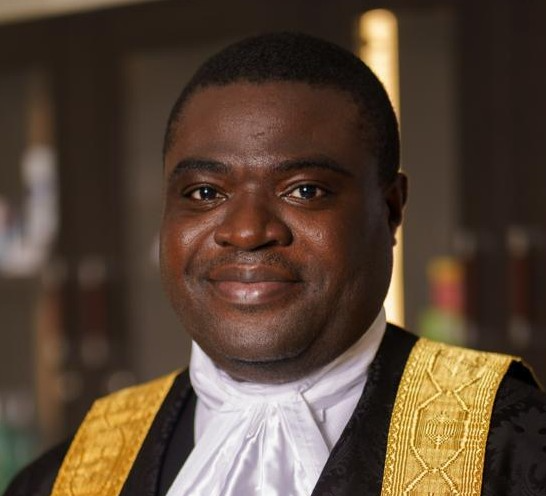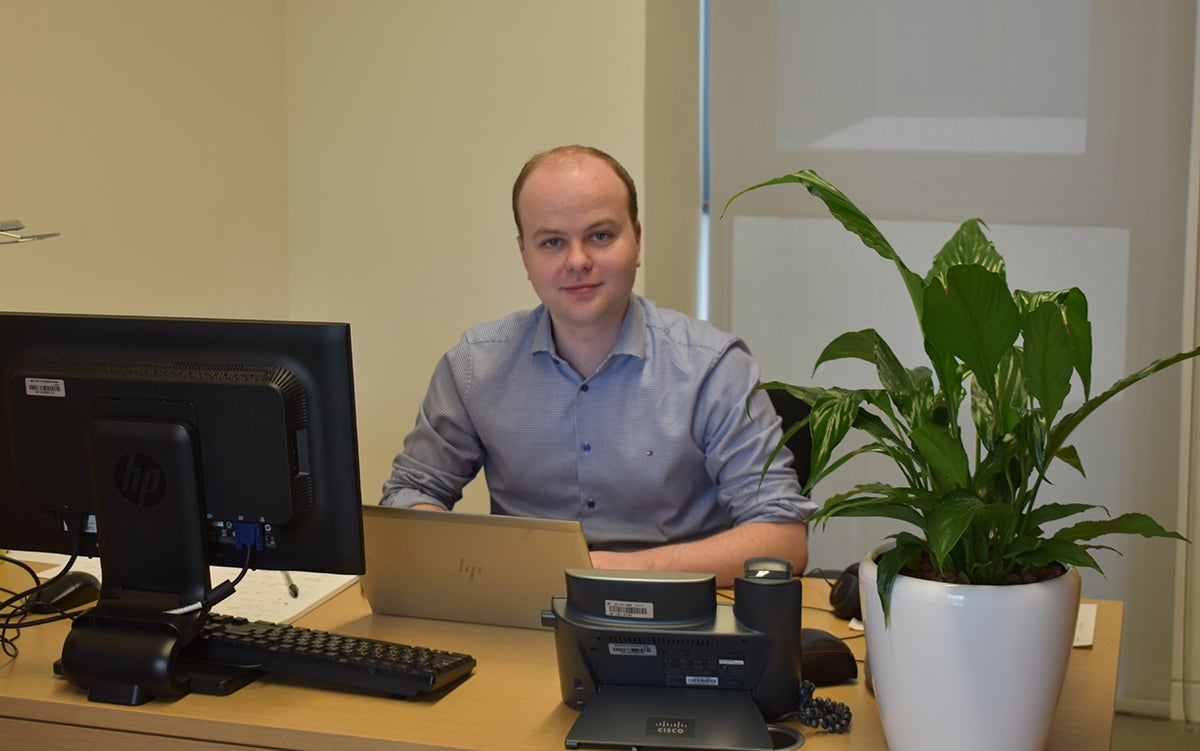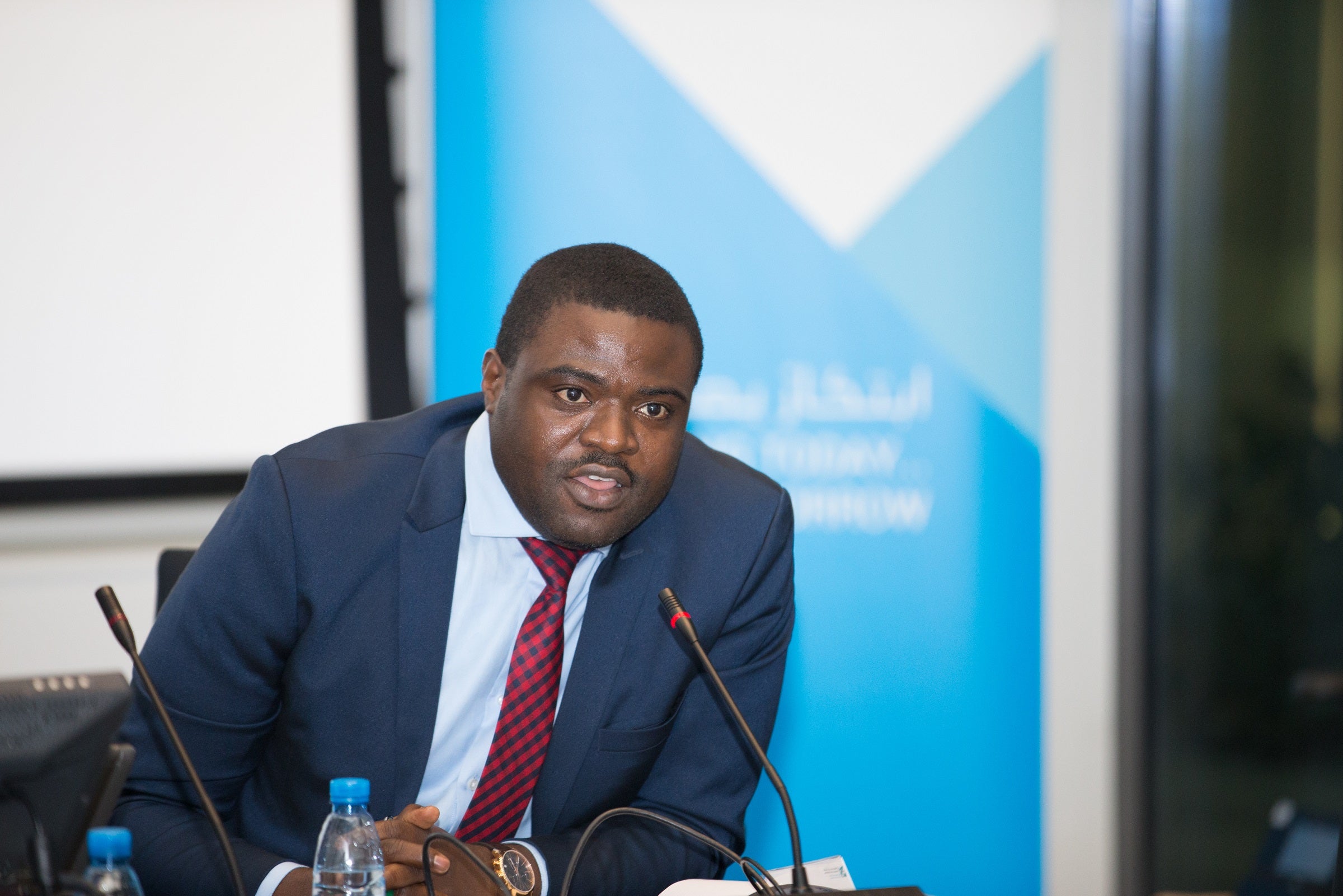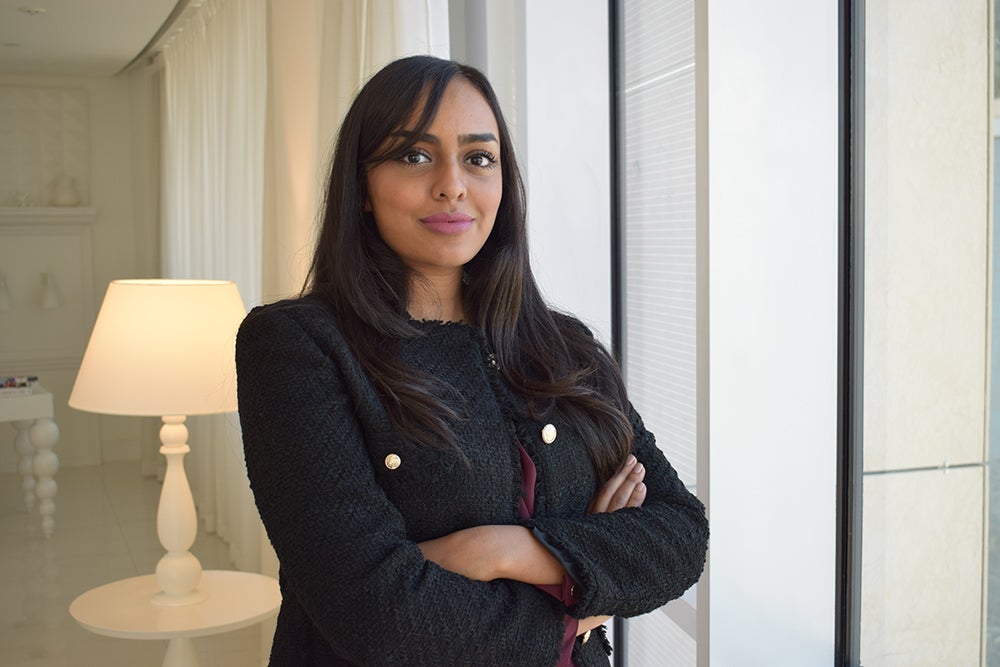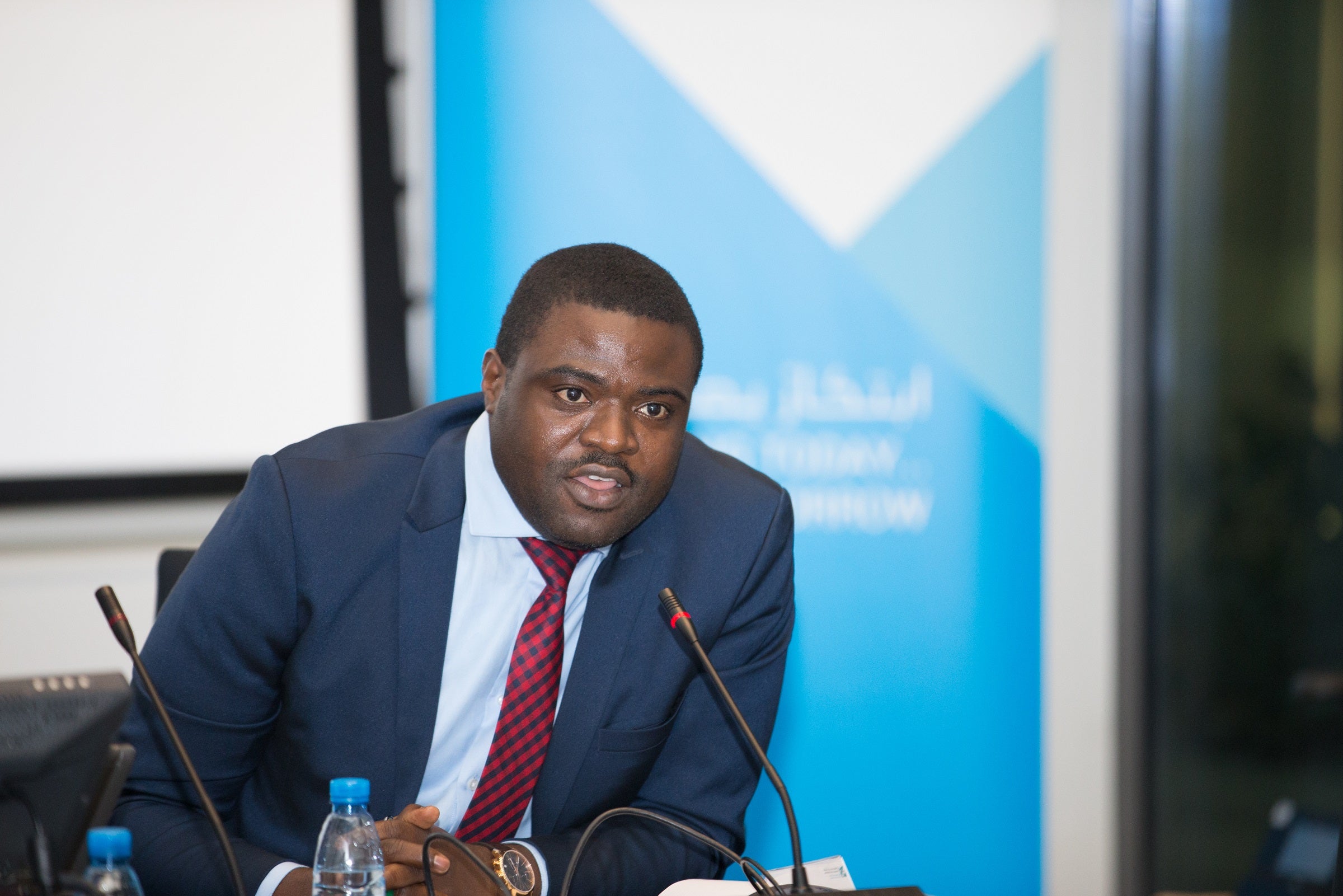
Interview with Dr. Susan L. Karamanian
Dean, College of Law (CL), Hamad Bin Khalifa University
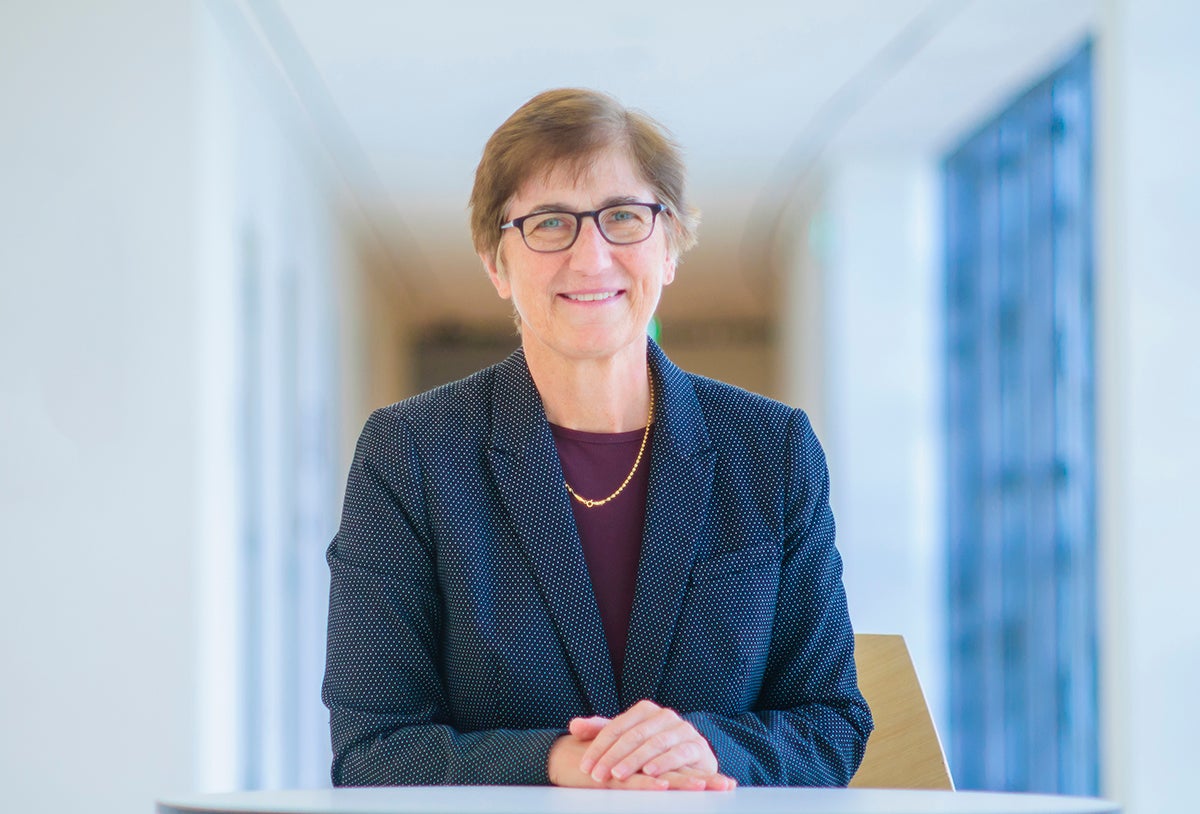
How important is it that students can finally return to the classroom and how has the college adapted during the pandemic?
Teaching law involves an intense interaction between faculty and students with the former asking students to apply recognized legal principles to complex factual situations and draw out new principles from that exercise as well as challenge existing legal norms. Face-to-face engagement is critical as it facilitates the interactive process. The ability to clarify and correct is easier in person than over the internet. Also, students tend to be more forthcoming and engaged with the substance and each other when in the traditional classroom setting. Further, we place a premium on our students developing life-long relationships, and this aim is best achieved when they can enjoy a coffee or tea with each other between classes or simply sit down and talk.
During the pandemic, the College of Law quickly shifted all classes to an online platform. The first few months enabled us to draw lessons, and thanks to the work of Professor George Dimitropoulos, we devised a college approach to online teaching. Over the past 18 months, faculty adjusted their teaching styles to help ensure a focus on each individual student. Further, they have increasingly made use of videos and other online content in a way to promote a lively discussion of legal and related issues.
What are the main programs offered at your college and are there any that are unique or exclusive to the region?
We offer the three-year Juris Doctor (JD) degree, the only one of its kind in the MENA region, as well as the one-year LL.M. degree in International Economic and Business Law and the one-year LL.M. degree in International Law and Foreign Affairs. Further, this year, we are delighted to announce the launch of the Doctor of Juridical Science (S.J.D.) degree, the highest research degree in law, and again it is the first of its kind in the MENA region.
The JD degree is based on the US model, which recognizes that the study of law is a graduate-level endeavor. Students in the JD degree program already have a first degree in any subject, and many of them have related work experience. The JD degree enables Qataris to become licensed lawyers in Qatar, subject to meeting the licensing requirements and completing a six-week certificate course offered by the College of Law. We are thrilled that our JD graduates also have paths to become lawyers in New York and Canada, again subject to meeting additional educational and licensing requirements of those jurisdictions. The LL.M. degree addresses subjects of importance to Qatar and requires students to write a thesis on a topic of their choice relevant to the subject area of the degree. The S.J.D. degree will enable a select group of JD and LL.M. graduates with a strong legal background to focus on writing a high-quality, publishable S.J.D. dissertation. Its offering is in line with HBKU’s research mission as graduates from the program will have the research skills and track record to pursue an academic career.
What role does your college play in addressing the country’s national challenges, and how do your graduates support economic and social progress in Qatar?
Qatar is involved in a variety of important initiatives, such as the FIFA World Cup 2022, upcoming Shura Council elections, and path-breaking work in the field of healthcare. Each of these has complex regulatory issues with tremendous legal implications. A current research project that HBKU is funding, for example, examines the development of a legal code for the use of artificial intelligence (AI) in precision medicine and health technologies. We are excited that one of our JD alumni will be working with College of Law Professor Dr. Barry Solaiman on this initiative, which will help develop standards for medical treatment using AI throughout the country. Our alumni are working on legal issues in the Supreme Committee for Delivery and Legacy, Qatar Petroleum, and the Qatar Financial Centre, as well as the Ministry of Foreign Affairs (MOFA) and the Ministry of Commerce and Industry (MOCI). An upcoming activity, which is due to the outreach of one of our alumni at MOCI, will involve working with the World Intellectual Property Organization (WIPO) to promote the legal capacity to protect intellectual property (IP) in Qatar. Securing IP rights to inventors is one way that Qatar can promote innovation and economic development.
Another exciting new initiative of the College of Law is outreach to K-12 about the importance of the rule of law. JD alumna and College of Law lecturer, Aisha Al Naama, is working on a short booklet about the significance of the Constitution of Qatar, which we expect to use in sessions with grade school students, and we are discussing ways to have a hard copy of the Constitution more accessible to all students.
We are also starting a project with one of our alumni and a current JD student that will address issues relating to family law, specifically the need for a code of family law procedure and the substance of a proposed code. We have a lot on our plate and look forward to having our students and alumni involved in these exciting projects that we hope will help Qatar and the region.
Related News

HBKU’S College of Law and Public Policy Colloquium to Examine Dispute Resolution Between Countries
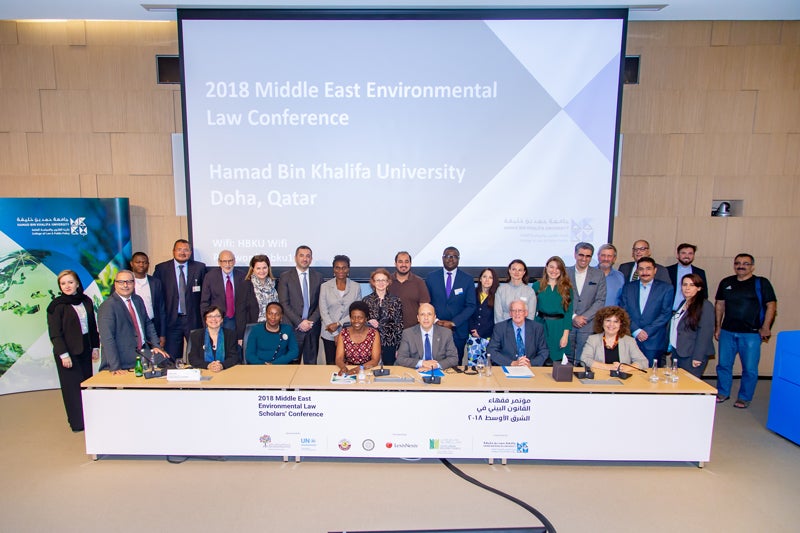
HBKU Conference Highlights Need to Introduce Environmental Law to Higher Education in the Middle East

The Promise of Hybrid Dispute Resolution Fora Conference to be Held at HBKU’s College of Law and Public Policy
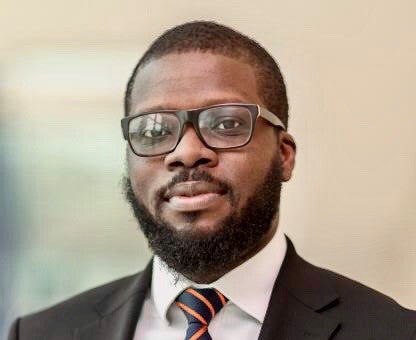
HBKU’s College of Law Faculty Selected on 2020 List of ‘35 Leaders of the Future in Taxation’
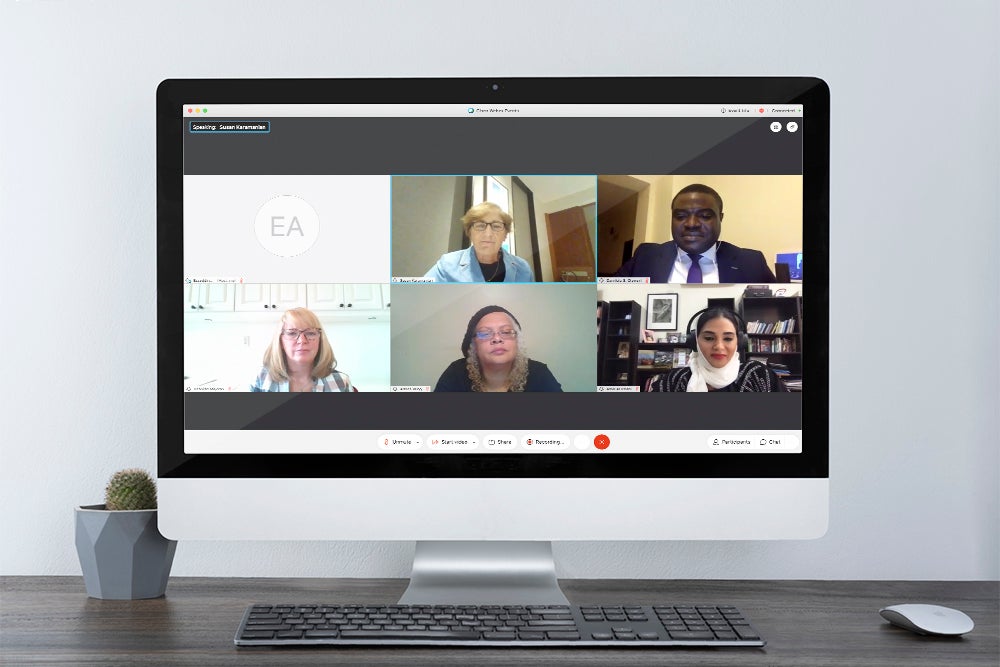
College of Law Event Joins Dots Between Eliminating Racism and Achieving Sustainable Societies
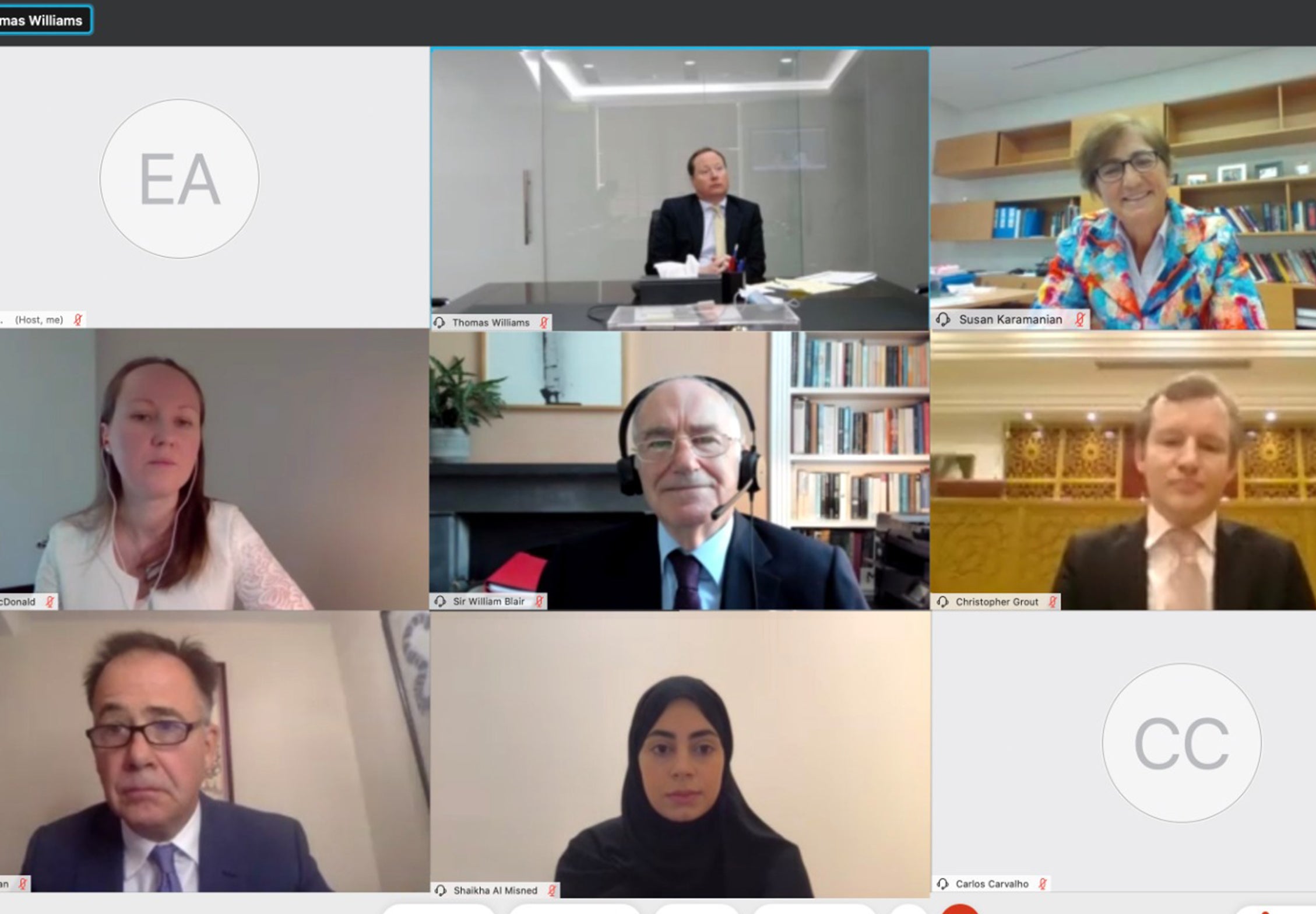
College of Law Webinar Considers Effects of COVID-19 on Commercial Contracts and Sovereign Borrowing
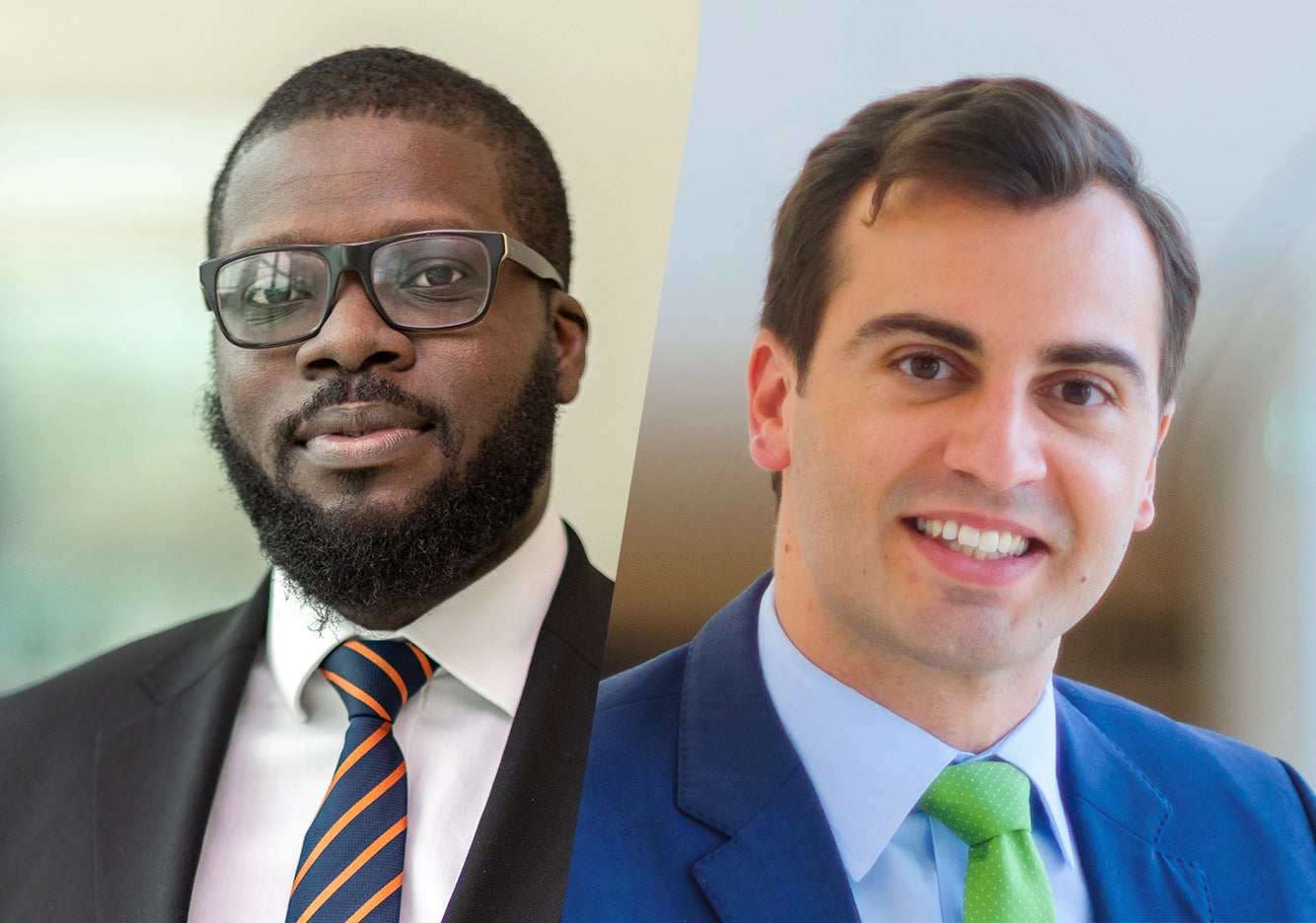
Qatar’s New Public-Private Partnership Law: Towards a Sustainable Approach to Development
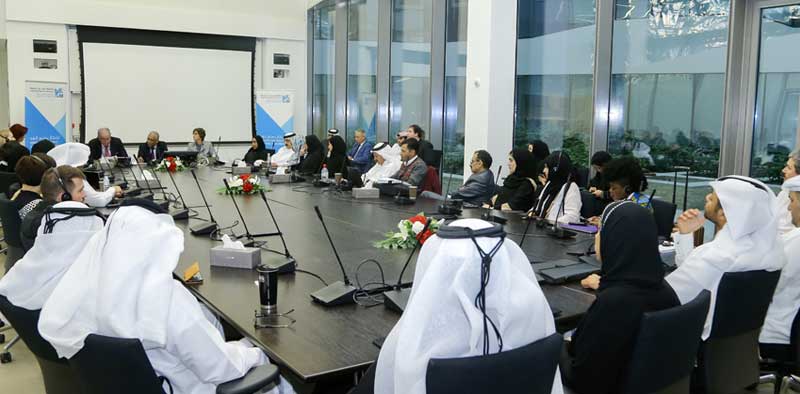
HBKU’s College of Law and Public Policy Hosts Minister-President of Paraguay’s Supreme Court of Justice

HBKU’S College of Law and Public Policy Colloquium to Examine Dispute Resolution Between Countries

HBKU Conference Highlights Need to Introduce Environmental Law to Higher Education in the Middle East

The Promise of Hybrid Dispute Resolution Fora Conference to be Held at HBKU’s College of Law and Public Policy

HBKU’s College of Law Faculty Selected on 2020 List of ‘35 Leaders of the Future in Taxation’

College of Law Event Joins Dots Between Eliminating Racism and Achieving Sustainable Societies

College of Law Webinar Considers Effects of COVID-19 on Commercial Contracts and Sovereign Borrowing

Qatar’s New Public-Private Partnership Law: Towards a Sustainable Approach to Development

HBKU’s College of Law and Public Policy Hosts Minister-President of Paraguay’s Supreme Court of Justice

HBKU’S College of Law and Public Policy Colloquium to Examine Dispute Resolution Between Countries

HBKU Conference Highlights Need to Introduce Environmental Law to Higher Education in the Middle East

The Promise of Hybrid Dispute Resolution Fora Conference to be Held at HBKU’s College of Law and Public Policy

HBKU’s College of Law Faculty Selected on 2020 List of ‘35 Leaders of the Future in Taxation’

College of Law Event Joins Dots Between Eliminating Racism and Achieving Sustainable Societies

College of Law Webinar Considers Effects of COVID-19 on Commercial Contracts and Sovereign Borrowing

Qatar’s New Public-Private Partnership Law: Towards a Sustainable Approach to Development

HBKU’s College of Law and Public Policy Hosts Minister-President of Paraguay’s Supreme Court of Justice

HBKU’S College of Law and Public Policy Colloquium to Examine Dispute Resolution Between Countries

HBKU Conference Highlights Need to Introduce Environmental Law to Higher Education in the Middle East

The Promise of Hybrid Dispute Resolution Fora Conference to be Held at HBKU’s College of Law and Public Policy

HBKU’s College of Law Faculty Selected on 2020 List of ‘35 Leaders of the Future in Taxation’

College of Law Event Joins Dots Between Eliminating Racism and Achieving Sustainable Societies

College of Law Webinar Considers Effects of COVID-19 on Commercial Contracts and Sovereign Borrowing

Qatar’s New Public-Private Partnership Law: Towards a Sustainable Approach to Development

HBKU’s College of Law and Public Policy Hosts Minister-President of Paraguay’s Supreme Court of Justice

HBKU’S College of Law and Public Policy Colloquium to Examine Dispute Resolution Between Countries

HBKU Conference Highlights Need to Introduce Environmental Law to Higher Education in the Middle East

The Promise of Hybrid Dispute Resolution Fora Conference to be Held at HBKU’s College of Law and Public Policy

HBKU’s College of Law Faculty Selected on 2020 List of ‘35 Leaders of the Future in Taxation’

College of Law Event Joins Dots Between Eliminating Racism and Achieving Sustainable Societies

College of Law Webinar Considers Effects of COVID-19 on Commercial Contracts and Sovereign Borrowing

Qatar’s New Public-Private Partnership Law: Towards a Sustainable Approach to Development

HBKU’s College of Law and Public Policy Hosts Minister-President of Paraguay’s Supreme Court of Justice

HBKU’S College of Law and Public Policy Colloquium to Examine Dispute Resolution Between Countries

HBKU Conference Highlights Need to Introduce Environmental Law to Higher Education in the Middle East

The Promise of Hybrid Dispute Resolution Fora Conference to be Held at HBKU’s College of Law and Public Policy

HBKU’s College of Law Faculty Selected on 2020 List of ‘35 Leaders of the Future in Taxation’

College of Law Event Joins Dots Between Eliminating Racism and Achieving Sustainable Societies

College of Law Webinar Considers Effects of COVID-19 on Commercial Contracts and Sovereign Borrowing

Qatar’s New Public-Private Partnership Law: Towards a Sustainable Approach to Development

HBKU’s College of Law and Public Policy Hosts Minister-President of Paraguay’s Supreme Court of Justice

HBKU’S College of Law and Public Policy Colloquium to Examine Dispute Resolution Between Countries

HBKU Conference Highlights Need to Introduce Environmental Law to Higher Education in the Middle East

The Promise of Hybrid Dispute Resolution Fora Conference to be Held at HBKU’s College of Law and Public Policy

HBKU’s College of Law Faculty Selected on 2020 List of ‘35 Leaders of the Future in Taxation’

College of Law Event Joins Dots Between Eliminating Racism and Achieving Sustainable Societies

College of Law Webinar Considers Effects of COVID-19 on Commercial Contracts and Sovereign Borrowing

Qatar’s New Public-Private Partnership Law: Towards a Sustainable Approach to Development

HBKU’s College of Law and Public Policy Hosts Minister-President of Paraguay’s Supreme Court of Justice

HBKU’S College of Law and Public Policy Colloquium to Examine Dispute Resolution Between Countries

HBKU Conference Highlights Need to Introduce Environmental Law to Higher Education in the Middle East

The Promise of Hybrid Dispute Resolution Fora Conference to be Held at HBKU’s College of Law and Public Policy

HBKU’s College of Law Faculty Selected on 2020 List of ‘35 Leaders of the Future in Taxation’

College of Law Event Joins Dots Between Eliminating Racism and Achieving Sustainable Societies

College of Law Webinar Considers Effects of COVID-19 on Commercial Contracts and Sovereign Borrowing

Qatar’s New Public-Private Partnership Law: Towards a Sustainable Approach to Development

HBKU’s College of Law and Public Policy Hosts Minister-President of Paraguay’s Supreme Court of Justice

HBKU’S College of Law and Public Policy Colloquium to Examine Dispute Resolution Between Countries

HBKU Conference Highlights Need to Introduce Environmental Law to Higher Education in the Middle East

The Promise of Hybrid Dispute Resolution Fora Conference to be Held at HBKU’s College of Law and Public Policy

HBKU’s College of Law Faculty Selected on 2020 List of ‘35 Leaders of the Future in Taxation’

College of Law Event Joins Dots Between Eliminating Racism and Achieving Sustainable Societies

College of Law Webinar Considers Effects of COVID-19 on Commercial Contracts and Sovereign Borrowing

Qatar’s New Public-Private Partnership Law: Towards a Sustainable Approach to Development

HBKU’s College of Law and Public Policy Hosts Minister-President of Paraguay’s Supreme Court of Justice

HBKU’S College of Law and Public Policy Colloquium to Examine Dispute Resolution Between Countries

HBKU Conference Highlights Need to Introduce Environmental Law to Higher Education in the Middle East

The Promise of Hybrid Dispute Resolution Fora Conference to be Held at HBKU’s College of Law and Public Policy

HBKU’s College of Law Faculty Selected on 2020 List of ‘35 Leaders of the Future in Taxation’

College of Law Event Joins Dots Between Eliminating Racism and Achieving Sustainable Societies

College of Law Webinar Considers Effects of COVID-19 on Commercial Contracts and Sovereign Borrowing

Qatar’s New Public-Private Partnership Law: Towards a Sustainable Approach to Development

HBKU’s College of Law and Public Policy Hosts Minister-President of Paraguay’s Supreme Court of Justice

HBKU’S College of Law and Public Policy Colloquium to Examine Dispute Resolution Between Countries

HBKU Conference Highlights Need to Introduce Environmental Law to Higher Education in the Middle East

The Promise of Hybrid Dispute Resolution Fora Conference to be Held at HBKU’s College of Law and Public Policy

HBKU’s College of Law Faculty Selected on 2020 List of ‘35 Leaders of the Future in Taxation’

College of Law Event Joins Dots Between Eliminating Racism and Achieving Sustainable Societies

College of Law Webinar Considers Effects of COVID-19 on Commercial Contracts and Sovereign Borrowing

Qatar’s New Public-Private Partnership Law: Towards a Sustainable Approach to Development

HBKU’s College of Law and Public Policy Hosts Minister-President of Paraguay’s Supreme Court of Justice

HBKU’S College of Law and Public Policy Colloquium to Examine Dispute Resolution Between Countries

HBKU Conference Highlights Need to Introduce Environmental Law to Higher Education in the Middle East

The Promise of Hybrid Dispute Resolution Fora Conference to be Held at HBKU’s College of Law and Public Policy

HBKU’s College of Law Faculty Selected on 2020 List of ‘35 Leaders of the Future in Taxation’

College of Law Event Joins Dots Between Eliminating Racism and Achieving Sustainable Societies

College of Law Webinar Considers Effects of COVID-19 on Commercial Contracts and Sovereign Borrowing

Qatar’s New Public-Private Partnership Law: Towards a Sustainable Approach to Development

HBKU’s College of Law and Public Policy Hosts Minister-President of Paraguay’s Supreme Court of Justice

HBKU’S College of Law and Public Policy Colloquium to Examine Dispute Resolution Between Countries

HBKU Conference Highlights Need to Introduce Environmental Law to Higher Education in the Middle East

The Promise of Hybrid Dispute Resolution Fora Conference to be Held at HBKU’s College of Law and Public Policy

HBKU’s College of Law Faculty Selected on 2020 List of ‘35 Leaders of the Future in Taxation’

College of Law Event Joins Dots Between Eliminating Racism and Achieving Sustainable Societies

College of Law Webinar Considers Effects of COVID-19 on Commercial Contracts and Sovereign Borrowing

Qatar’s New Public-Private Partnership Law: Towards a Sustainable Approach to Development

HBKU’s College of Law and Public Policy Hosts Minister-President of Paraguay’s Supreme Court of Justice

HBKU’S College of Law and Public Policy Colloquium to Examine Dispute Resolution Between Countries

HBKU Conference Highlights Need to Introduce Environmental Law to Higher Education in the Middle East

The Promise of Hybrid Dispute Resolution Fora Conference to be Held at HBKU’s College of Law and Public Policy

HBKU’s College of Law Faculty Selected on 2020 List of ‘35 Leaders of the Future in Taxation’

College of Law Event Joins Dots Between Eliminating Racism and Achieving Sustainable Societies

College of Law Webinar Considers Effects of COVID-19 on Commercial Contracts and Sovereign Borrowing

Qatar’s New Public-Private Partnership Law: Towards a Sustainable Approach to Development

HBKU’s College of Law and Public Policy Hosts Minister-President of Paraguay’s Supreme Court of Justice

HBKU’S College of Law and Public Policy Colloquium to Examine Dispute Resolution Between Countries

HBKU Conference Highlights Need to Introduce Environmental Law to Higher Education in the Middle East

The Promise of Hybrid Dispute Resolution Fora Conference to be Held at HBKU’s College of Law and Public Policy

HBKU’s College of Law Faculty Selected on 2020 List of ‘35 Leaders of the Future in Taxation’

College of Law Event Joins Dots Between Eliminating Racism and Achieving Sustainable Societies

College of Law Webinar Considers Effects of COVID-19 on Commercial Contracts and Sovereign Borrowing

Qatar’s New Public-Private Partnership Law: Towards a Sustainable Approach to Development

HBKU’s College of Law and Public Policy Hosts Minister-President of Paraguay’s Supreme Court of Justice

HBKU’S College of Law and Public Policy Colloquium to Examine Dispute Resolution Between Countries

HBKU Conference Highlights Need to Introduce Environmental Law to Higher Education in the Middle East

The Promise of Hybrid Dispute Resolution Fora Conference to be Held at HBKU’s College of Law and Public Policy

HBKU’s College of Law Faculty Selected on 2020 List of ‘35 Leaders of the Future in Taxation’

College of Law Event Joins Dots Between Eliminating Racism and Achieving Sustainable Societies

College of Law Webinar Considers Effects of COVID-19 on Commercial Contracts and Sovereign Borrowing

Qatar’s New Public-Private Partnership Law: Towards a Sustainable Approach to Development

HBKU’s College of Law and Public Policy Hosts Minister-President of Paraguay’s Supreme Court of Justice

HBKU’S College of Law and Public Policy Colloquium to Examine Dispute Resolution Between Countries

HBKU Conference Highlights Need to Introduce Environmental Law to Higher Education in the Middle East

The Promise of Hybrid Dispute Resolution Fora Conference to be Held at HBKU’s College of Law and Public Policy

HBKU’s College of Law Faculty Selected on 2020 List of ‘35 Leaders of the Future in Taxation’

College of Law Event Joins Dots Between Eliminating Racism and Achieving Sustainable Societies

College of Law Webinar Considers Effects of COVID-19 on Commercial Contracts and Sovereign Borrowing

Qatar’s New Public-Private Partnership Law: Towards a Sustainable Approach to Development

HBKU’s College of Law and Public Policy Hosts Minister-President of Paraguay’s Supreme Court of Justice

HBKU’S College of Law and Public Policy Colloquium to Examine Dispute Resolution Between Countries

HBKU Conference Highlights Need to Introduce Environmental Law to Higher Education in the Middle East

The Promise of Hybrid Dispute Resolution Fora Conference to be Held at HBKU’s College of Law and Public Policy

HBKU’s College of Law Faculty Selected on 2020 List of ‘35 Leaders of the Future in Taxation’

College of Law Event Joins Dots Between Eliminating Racism and Achieving Sustainable Societies

College of Law Webinar Considers Effects of COVID-19 on Commercial Contracts and Sovereign Borrowing

Qatar’s New Public-Private Partnership Law: Towards a Sustainable Approach to Development

HBKU’s College of Law and Public Policy Hosts Minister-President of Paraguay’s Supreme Court of Justice

HBKU’S College of Law and Public Policy Colloquium to Examine Dispute Resolution Between Countries

HBKU Conference Highlights Need to Introduce Environmental Law to Higher Education in the Middle East

The Promise of Hybrid Dispute Resolution Fora Conference to be Held at HBKU’s College of Law and Public Policy

HBKU’s College of Law Faculty Selected on 2020 List of ‘35 Leaders of the Future in Taxation’

College of Law Event Joins Dots Between Eliminating Racism and Achieving Sustainable Societies

College of Law Webinar Considers Effects of COVID-19 on Commercial Contracts and Sovereign Borrowing

Qatar’s New Public-Private Partnership Law: Towards a Sustainable Approach to Development

HBKU’s College of Law and Public Policy Hosts Minister-President of Paraguay’s Supreme Court of Justice

HBKU’S College of Law and Public Policy Colloquium to Examine Dispute Resolution Between Countries

HBKU Conference Highlights Need to Introduce Environmental Law to Higher Education in the Middle East

The Promise of Hybrid Dispute Resolution Fora Conference to be Held at HBKU’s College of Law and Public Policy

HBKU’s College of Law Faculty Selected on 2020 List of ‘35 Leaders of the Future in Taxation’

College of Law Event Joins Dots Between Eliminating Racism and Achieving Sustainable Societies

College of Law Webinar Considers Effects of COVID-19 on Commercial Contracts and Sovereign Borrowing

Qatar’s New Public-Private Partnership Law: Towards a Sustainable Approach to Development

HBKU’s College of Law and Public Policy Hosts Minister-President of Paraguay’s Supreme Court of Justice

HBKU’S College of Law and Public Policy Colloquium to Examine Dispute Resolution Between Countries

HBKU Conference Highlights Need to Introduce Environmental Law to Higher Education in the Middle East

The Promise of Hybrid Dispute Resolution Fora Conference to be Held at HBKU’s College of Law and Public Policy

HBKU’s College of Law Faculty Selected on 2020 List of ‘35 Leaders of the Future in Taxation’

College of Law Event Joins Dots Between Eliminating Racism and Achieving Sustainable Societies

College of Law Webinar Considers Effects of COVID-19 on Commercial Contracts and Sovereign Borrowing

Qatar’s New Public-Private Partnership Law: Towards a Sustainable Approach to Development

HBKU’s College of Law and Public Policy Hosts Minister-President of Paraguay’s Supreme Court of Justice

HBKU’S College of Law and Public Policy Colloquium to Examine Dispute Resolution Between Countries

HBKU Conference Highlights Need to Introduce Environmental Law to Higher Education in the Middle East

The Promise of Hybrid Dispute Resolution Fora Conference to be Held at HBKU’s College of Law and Public Policy

HBKU’s College of Law Faculty Selected on 2020 List of ‘35 Leaders of the Future in Taxation’

College of Law Event Joins Dots Between Eliminating Racism and Achieving Sustainable Societies

College of Law Webinar Considers Effects of COVID-19 on Commercial Contracts and Sovereign Borrowing

Qatar’s New Public-Private Partnership Law: Towards a Sustainable Approach to Development

HBKU’s College of Law and Public Policy Hosts Minister-President of Paraguay’s Supreme Court of Justice

HBKU’S College of Law and Public Policy Colloquium to Examine Dispute Resolution Between Countries

HBKU Conference Highlights Need to Introduce Environmental Law to Higher Education in the Middle East

The Promise of Hybrid Dispute Resolution Fora Conference to be Held at HBKU’s College of Law and Public Policy

HBKU’s College of Law Faculty Selected on 2020 List of ‘35 Leaders of the Future in Taxation’

College of Law Event Joins Dots Between Eliminating Racism and Achieving Sustainable Societies

College of Law Webinar Considers Effects of COVID-19 on Commercial Contracts and Sovereign Borrowing

Qatar’s New Public-Private Partnership Law: Towards a Sustainable Approach to Development

HBKU’s College of Law and Public Policy Hosts Minister-President of Paraguay’s Supreme Court of Justice

HBKU’S College of Law and Public Policy Colloquium to Examine Dispute Resolution Between Countries

HBKU Conference Highlights Need to Introduce Environmental Law to Higher Education in the Middle East

The Promise of Hybrid Dispute Resolution Fora Conference to be Held at HBKU’s College of Law and Public Policy

HBKU’s College of Law Faculty Selected on 2020 List of ‘35 Leaders of the Future in Taxation’

College of Law Event Joins Dots Between Eliminating Racism and Achieving Sustainable Societies

College of Law Webinar Considers Effects of COVID-19 on Commercial Contracts and Sovereign Borrowing

Qatar’s New Public-Private Partnership Law: Towards a Sustainable Approach to Development

HBKU’s College of Law and Public Policy Hosts Minister-President of Paraguay’s Supreme Court of Justice

HBKU’S College of Law and Public Policy Colloquium to Examine Dispute Resolution Between Countries

HBKU Conference Highlights Need to Introduce Environmental Law to Higher Education in the Middle East

The Promise of Hybrid Dispute Resolution Fora Conference to be Held at HBKU’s College of Law and Public Policy

HBKU’s College of Law Faculty Selected on 2020 List of ‘35 Leaders of the Future in Taxation’

College of Law Event Joins Dots Between Eliminating Racism and Achieving Sustainable Societies

College of Law Webinar Considers Effects of COVID-19 on Commercial Contracts and Sovereign Borrowing

Qatar’s New Public-Private Partnership Law: Towards a Sustainable Approach to Development

HBKU’s College of Law and Public Policy Hosts Minister-President of Paraguay’s Supreme Court of Justice

HBKU’S College of Law and Public Policy Colloquium to Examine Dispute Resolution Between Countries

HBKU Conference Highlights Need to Introduce Environmental Law to Higher Education in the Middle East

The Promise of Hybrid Dispute Resolution Fora Conference to be Held at HBKU’s College of Law and Public Policy

HBKU’s College of Law Faculty Selected on 2020 List of ‘35 Leaders of the Future in Taxation’

College of Law Event Joins Dots Between Eliminating Racism and Achieving Sustainable Societies

College of Law Webinar Considers Effects of COVID-19 on Commercial Contracts and Sovereign Borrowing

Qatar’s New Public-Private Partnership Law: Towards a Sustainable Approach to Development

HBKU’s College of Law and Public Policy Hosts Minister-President of Paraguay’s Supreme Court of Justice

HBKU’S College of Law and Public Policy Colloquium to Examine Dispute Resolution Between Countries

HBKU Conference Highlights Need to Introduce Environmental Law to Higher Education in the Middle East

The Promise of Hybrid Dispute Resolution Fora Conference to be Held at HBKU’s College of Law and Public Policy

HBKU’s College of Law Faculty Selected on 2020 List of ‘35 Leaders of the Future in Taxation’

College of Law Event Joins Dots Between Eliminating Racism and Achieving Sustainable Societies

College of Law Webinar Considers Effects of COVID-19 on Commercial Contracts and Sovereign Borrowing

Qatar’s New Public-Private Partnership Law: Towards a Sustainable Approach to Development

HBKU’s College of Law and Public Policy Hosts Minister-President of Paraguay’s Supreme Court of Justice

HBKU’S College of Law and Public Policy Colloquium to Examine Dispute Resolution Between Countries

HBKU Conference Highlights Need to Introduce Environmental Law to Higher Education in the Middle East

The Promise of Hybrid Dispute Resolution Fora Conference to be Held at HBKU’s College of Law and Public Policy

HBKU’s College of Law Faculty Selected on 2020 List of ‘35 Leaders of the Future in Taxation’

College of Law Event Joins Dots Between Eliminating Racism and Achieving Sustainable Societies

College of Law Webinar Considers Effects of COVID-19 on Commercial Contracts and Sovereign Borrowing

Qatar’s New Public-Private Partnership Law: Towards a Sustainable Approach to Development

HBKU’s College of Law and Public Policy Hosts Minister-President of Paraguay’s Supreme Court of Justice

HBKU’S College of Law and Public Policy Colloquium to Examine Dispute Resolution Between Countries

HBKU Conference Highlights Need to Introduce Environmental Law to Higher Education in the Middle East

The Promise of Hybrid Dispute Resolution Fora Conference to be Held at HBKU’s College of Law and Public Policy

HBKU’s College of Law Faculty Selected on 2020 List of ‘35 Leaders of the Future in Taxation’

College of Law Event Joins Dots Between Eliminating Racism and Achieving Sustainable Societies

College of Law Webinar Considers Effects of COVID-19 on Commercial Contracts and Sovereign Borrowing

Qatar’s New Public-Private Partnership Law: Towards a Sustainable Approach to Development

HBKU’s College of Law and Public Policy Hosts Minister-President of Paraguay’s Supreme Court of Justice

HBKU’S College of Law and Public Policy Colloquium to Examine Dispute Resolution Between Countries

HBKU Conference Highlights Need to Introduce Environmental Law to Higher Education in the Middle East

The Promise of Hybrid Dispute Resolution Fora Conference to be Held at HBKU’s College of Law and Public Policy

HBKU’s College of Law Faculty Selected on 2020 List of ‘35 Leaders of the Future in Taxation’

College of Law Event Joins Dots Between Eliminating Racism and Achieving Sustainable Societies

College of Law Webinar Considers Effects of COVID-19 on Commercial Contracts and Sovereign Borrowing

Qatar’s New Public-Private Partnership Law: Towards a Sustainable Approach to Development

HBKU’s College of Law and Public Policy Hosts Minister-President of Paraguay’s Supreme Court of Justice

HBKU’S College of Law and Public Policy Colloquium to Examine Dispute Resolution Between Countries

HBKU Conference Highlights Need to Introduce Environmental Law to Higher Education in the Middle East

The Promise of Hybrid Dispute Resolution Fora Conference to be Held at HBKU’s College of Law and Public Policy

HBKU’s College of Law Faculty Selected on 2020 List of ‘35 Leaders of the Future in Taxation’

College of Law Event Joins Dots Between Eliminating Racism and Achieving Sustainable Societies

College of Law Webinar Considers Effects of COVID-19 on Commercial Contracts and Sovereign Borrowing

Qatar’s New Public-Private Partnership Law: Towards a Sustainable Approach to Development

HBKU’s College of Law and Public Policy Hosts Minister-President of Paraguay’s Supreme Court of Justice

HBKU’S College of Law and Public Policy Colloquium to Examine Dispute Resolution Between Countries

HBKU Conference Highlights Need to Introduce Environmental Law to Higher Education in the Middle East

The Promise of Hybrid Dispute Resolution Fora Conference to be Held at HBKU’s College of Law and Public Policy

HBKU’s College of Law Faculty Selected on 2020 List of ‘35 Leaders of the Future in Taxation’

College of Law Event Joins Dots Between Eliminating Racism and Achieving Sustainable Societies

College of Law Webinar Considers Effects of COVID-19 on Commercial Contracts and Sovereign Borrowing

Qatar’s New Public-Private Partnership Law: Towards a Sustainable Approach to Development

HBKU’s College of Law and Public Policy Hosts Minister-President of Paraguay’s Supreme Court of Justice

HBKU’S College of Law and Public Policy Colloquium to Examine Dispute Resolution Between Countries

HBKU Conference Highlights Need to Introduce Environmental Law to Higher Education in the Middle East

The Promise of Hybrid Dispute Resolution Fora Conference to be Held at HBKU’s College of Law and Public Policy

HBKU’s College of Law Faculty Selected on 2020 List of ‘35 Leaders of the Future in Taxation’

College of Law Event Joins Dots Between Eliminating Racism and Achieving Sustainable Societies

College of Law Webinar Considers Effects of COVID-19 on Commercial Contracts and Sovereign Borrowing

Qatar’s New Public-Private Partnership Law: Towards a Sustainable Approach to Development

HBKU’s College of Law and Public Policy Hosts Minister-President of Paraguay’s Supreme Court of Justice

HBKU’S College of Law and Public Policy Colloquium to Examine Dispute Resolution Between Countries

HBKU Conference Highlights Need to Introduce Environmental Law to Higher Education in the Middle East

The Promise of Hybrid Dispute Resolution Fora Conference to be Held at HBKU’s College of Law and Public Policy

HBKU’s College of Law Faculty Selected on 2020 List of ‘35 Leaders of the Future in Taxation’

College of Law Event Joins Dots Between Eliminating Racism and Achieving Sustainable Societies

College of Law Webinar Considers Effects of COVID-19 on Commercial Contracts and Sovereign Borrowing

Qatar’s New Public-Private Partnership Law: Towards a Sustainable Approach to Development

HBKU’s College of Law and Public Policy Hosts Minister-President of Paraguay’s Supreme Court of Justice

HBKU’S College of Law and Public Policy Colloquium to Examine Dispute Resolution Between Countries

HBKU Conference Highlights Need to Introduce Environmental Law to Higher Education in the Middle East

The Promise of Hybrid Dispute Resolution Fora Conference to be Held at HBKU’s College of Law and Public Policy

HBKU’s College of Law Faculty Selected on 2020 List of ‘35 Leaders of the Future in Taxation’

College of Law Event Joins Dots Between Eliminating Racism and Achieving Sustainable Societies

College of Law Webinar Considers Effects of COVID-19 on Commercial Contracts and Sovereign Borrowing

Qatar’s New Public-Private Partnership Law: Towards a Sustainable Approach to Development

HBKU’s College of Law and Public Policy Hosts Minister-President of Paraguay’s Supreme Court of Justice

HBKU’S College of Law and Public Policy Colloquium to Examine Dispute Resolution Between Countries

HBKU Conference Highlights Need to Introduce Environmental Law to Higher Education in the Middle East

The Promise of Hybrid Dispute Resolution Fora Conference to be Held at HBKU’s College of Law and Public Policy

HBKU’s College of Law Faculty Selected on 2020 List of ‘35 Leaders of the Future in Taxation’

College of Law Event Joins Dots Between Eliminating Racism and Achieving Sustainable Societies

College of Law Webinar Considers Effects of COVID-19 on Commercial Contracts and Sovereign Borrowing

Qatar’s New Public-Private Partnership Law: Towards a Sustainable Approach to Development

HBKU’s College of Law and Public Policy Hosts Minister-President of Paraguay’s Supreme Court of Justice

HBKU’S College of Law and Public Policy Colloquium to Examine Dispute Resolution Between Countries

HBKU Conference Highlights Need to Introduce Environmental Law to Higher Education in the Middle East

The Promise of Hybrid Dispute Resolution Fora Conference to be Held at HBKU’s College of Law and Public Policy

HBKU’s College of Law Faculty Selected on 2020 List of ‘35 Leaders of the Future in Taxation’

College of Law Event Joins Dots Between Eliminating Racism and Achieving Sustainable Societies

College of Law Webinar Considers Effects of COVID-19 on Commercial Contracts and Sovereign Borrowing

Qatar’s New Public-Private Partnership Law: Towards a Sustainable Approach to Development

HBKU’s College of Law and Public Policy Hosts Minister-President of Paraguay’s Supreme Court of Justice

HBKU’S College of Law and Public Policy Colloquium to Examine Dispute Resolution Between Countries

HBKU Conference Highlights Need to Introduce Environmental Law to Higher Education in the Middle East

The Promise of Hybrid Dispute Resolution Fora Conference to be Held at HBKU’s College of Law and Public Policy

HBKU’s College of Law Faculty Selected on 2020 List of ‘35 Leaders of the Future in Taxation’

College of Law Event Joins Dots Between Eliminating Racism and Achieving Sustainable Societies

College of Law Webinar Considers Effects of COVID-19 on Commercial Contracts and Sovereign Borrowing

Qatar’s New Public-Private Partnership Law: Towards a Sustainable Approach to Development

HBKU’s College of Law and Public Policy Hosts Minister-President of Paraguay’s Supreme Court of Justice

HBKU’S College of Law and Public Policy Colloquium to Examine Dispute Resolution Between Countries

HBKU Conference Highlights Need to Introduce Environmental Law to Higher Education in the Middle East

The Promise of Hybrid Dispute Resolution Fora Conference to be Held at HBKU’s College of Law and Public Policy

HBKU’s College of Law Faculty Selected on 2020 List of ‘35 Leaders of the Future in Taxation’

College of Law Event Joins Dots Between Eliminating Racism and Achieving Sustainable Societies

College of Law Webinar Considers Effects of COVID-19 on Commercial Contracts and Sovereign Borrowing

Qatar’s New Public-Private Partnership Law: Towards a Sustainable Approach to Development

HBKU’s College of Law and Public Policy Hosts Minister-President of Paraguay’s Supreme Court of Justice

HBKU’S College of Law and Public Policy Colloquium to Examine Dispute Resolution Between Countries

HBKU Conference Highlights Need to Introduce Environmental Law to Higher Education in the Middle East

The Promise of Hybrid Dispute Resolution Fora Conference to be Held at HBKU’s College of Law and Public Policy

HBKU’s College of Law Faculty Selected on 2020 List of ‘35 Leaders of the Future in Taxation’

College of Law Event Joins Dots Between Eliminating Racism and Achieving Sustainable Societies

College of Law Webinar Considers Effects of COVID-19 on Commercial Contracts and Sovereign Borrowing

Qatar’s New Public-Private Partnership Law: Towards a Sustainable Approach to Development

HBKU’s College of Law and Public Policy Hosts Minister-President of Paraguay’s Supreme Court of Justice

HBKU’S College of Law and Public Policy Colloquium to Examine Dispute Resolution Between Countries

HBKU Conference Highlights Need to Introduce Environmental Law to Higher Education in the Middle East






